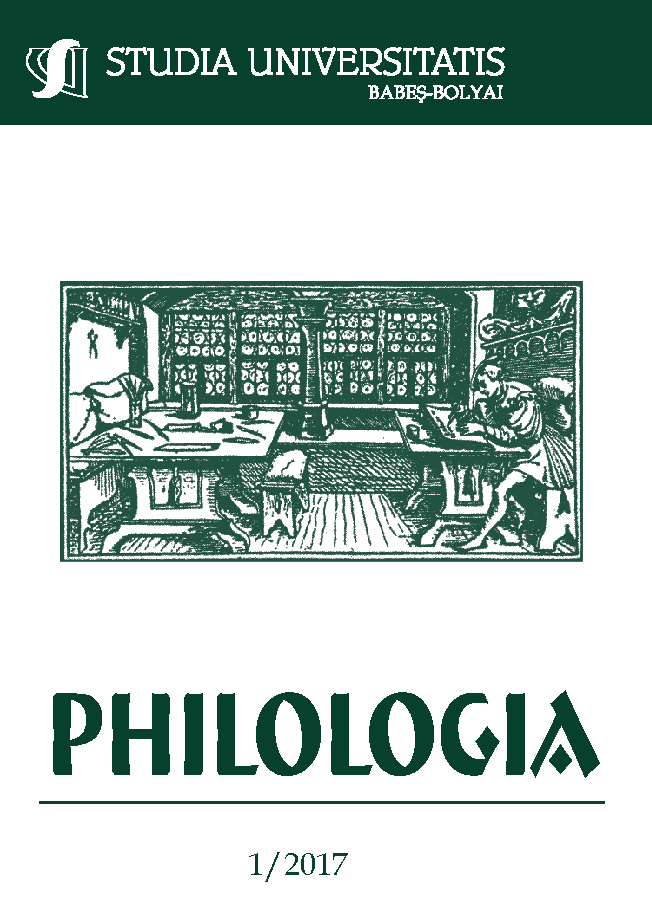THE OLD PATTERN AND THE CREATION OF THE NEW MASCULINE IDENTITY IN JULIE WU’S NOVEL
DOI:
https://doi.org/10.24193/subbphilo.2017.1.13Keywords:
Julie Wu, Frank Chin, wen, masculine identity, third son.Abstract
The Old Pattern and the Creation of the New Masculine Identity in Julie Wu’s Novel. This paper analyses the way in which Julie Wu transforms Saburo or Tong Chia-lin, the main character of her novel, into a true man. Unlike the great Chinese American author and critic Frank Chin, Julie Wu does not turn her character into a militant hero by developing his wu nature, but transforms him into a Taiwanese American scholar after developing his wen nature, through many years of studying and numerous sacrifices both in Taiwan and the United States of America.
REZUMAT. Vechiul model şi crearea noii identităţi masculine în romanul lui Julie Wu. Lucrarea de față analizează modul în care Julie Wu reușește să-și transforme personajul central al romanului ei, Saburo sau Tong Chia-lin, într-un bărbat adevărat. Spre deosebire de marele critic și scriitor sino-american Frank Chin, Julie Wu nu apelează la transformarea personajului ei într-un erou combatant prin dezvoltarea naturii wu, ci își transformă personajul într-un remarcabil învățat taiwanezo-american care și-a dezvoltat natura wen, după mulți ani de studiu și sacrificii în Taiwan și Statele Unite ale Americii.
Cuvinte cheie: Julie Wu, Frank Chin, wen, identitate masculină, al treilea fiu.
References
***. Aiiieeeee! An Anthology of Asian American Writers, edited by Frank Chin, Jeffery Paul Chan, Lawson Fusao Inada, Shawn Wong. Preface by Frank Chin. New York: Mentor Book, 1991. XXIII-XLI. Print.
Brown, Melissa J. Is Taiwan Chinese? The Impact of Culture, Power, and Migration on Changing Identities. Berkeley, Los Angeles and London: University of California Press, 2004. Web. 4 November 2016. < https://books.google.ro/books?id=m0PGuSUGDMC&printsec=frontcover&dq=Is+Taiwan+Chinese?+The+Impact+of+Culture,+Power,+and+Migration+on+Changing+Identities&hl=ro&sa=X&ved=0ahUKEwj_0OjVu-XQAhUEDSwKHcyKAaEQ6AEIGzAA#v=onepage&q=Is%20Taiwan%20Chinese%3F%20The%20Impact%20of%20Culture%2C%20Power%2C%20and%20Migration%20on%20Changing%20Identities&f=false >.
Chaurasia, Radhey Shyam. History of Modern China. New Delphi: Atlantic Publishers, 2004. Print.
Cheung, King-Kok. “The Woman Warrior versus The Chinaman Pacific.” The Masculine Studies Reader, edited by Rachel Adams and David Savran. Malden: Blackwell Publishing, 2002. 175-187. Print.
Dyer, Richard. “The White Man’s Muscles.” The Masculine Studies Reader, edited by Rachel Adams and David Savran. Malden: Blackwell Publishing, 2002. 262-273. Print.
Kam, Louie. Theorising Chinese Masculinity: Society and Gender in China. Cambridge: Cambridge University Press, 2002.
Krishaswamy, Revathi. “The Economy of Colonial Desire.” The Masculine Studies Reader, edited by Rachel Adams and David Savran. Malden: Blackwell Publishing, 2002.292-317. Print.
Ng, Franklin. The Taiwanese Americans. Westport, Connecticut, London: Greenwood Press, 1998. Print.
Roy, Denny. Taiwan: A Political History. Ithaca and London: Cornell University Press, 2003. Print.
Shimizu, Celine Parrenas. “A History of Race and He(te)rosexuality in the Movies: James Shigeta’s Asian American Male Stardom.” Global Asian American Popular Cultures, edited by De Shilpa Dave, Lei Lani Nishima and Tasha Oren. New York: New York University, 2016. 46-60. Web. 9 July 2016. <https://books.google.ro/books?id=F__LCgAAQBAJ&pg=PA50&dq=asian+man+in+america&hl=ro&sa=X&redir_esc=y#v=onepage&q=asian%20man%20in%20america&f=false>.
Wu, Julie. The Third Son. New York: Algonquin Books of Chapel Hill, 2013.Print.
Downloads
Published
How to Cite
Issue
Section
License
Copyright (c) 2017 Studia Universitatis Babeș-Bolyai Philologia

This work is licensed under a Creative Commons Attribution-NonCommercial-NoDerivatives 4.0 International License.





 ©Studia Universitatis Babeş-Bolyai Philologia. Published by Babeș-Bolyai University.
©Studia Universitatis Babeş-Bolyai Philologia. Published by Babeș-Bolyai University.